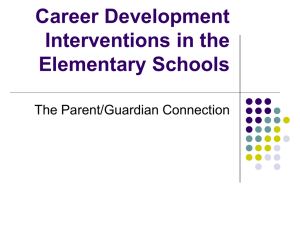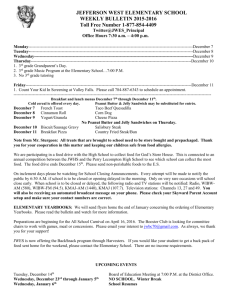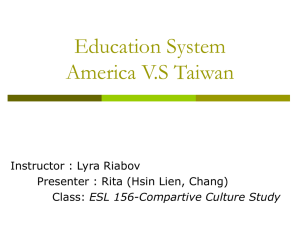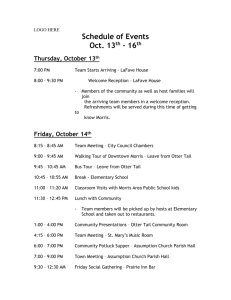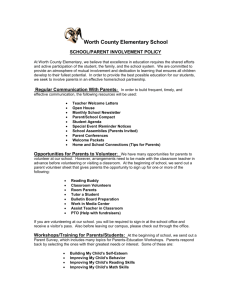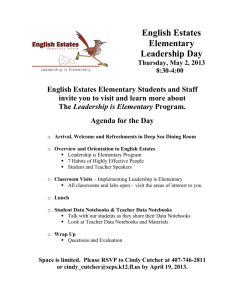Syllabus - University of Kentucky
advertisement
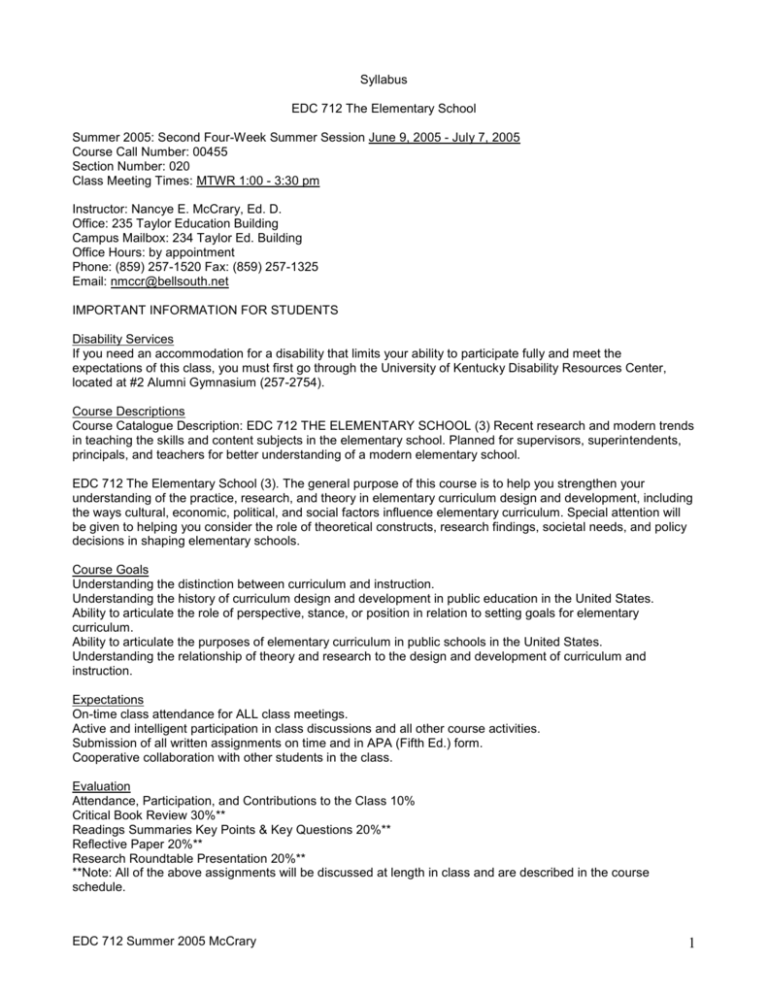
Syllabus EDC 712 The Elementary School Summer 2005: Second Four-Week Summer Session June 9, 2005 - July 7, 2005 Course Call Number: 00455 Section Number: 020 Class Meeting Times: MTWR 1:00 - 3:30 pm Instructor: Nancye E. McCrary, Ed. D. Office: 235 Taylor Education Building Campus Mailbox: 234 Taylor Ed. Building Office Hours: by appointment Phone: (859) 257-1520 Fax: (859) 257-1325 Email: nmccr@bellsouth.net IMPORTANT INFORMATION FOR STUDENTS Disability Services If you need an accommodation for a disability that limits your ability to participate fully and meet the expectations of this class, you must first go through the University of Kentucky Disability Resources Center, located at #2 Alumni Gymnasium (257-2754). Course Descriptions Course Catalogue Description: EDC 712 THE ELEMENTARY SCHOOL (3) Recent research and modern trends in teaching the skills and content subjects in the elementary school. Planned for supervisors, superintendents, principals, and teachers for better understanding of a modern elementary school. EDC 712 The Elementary School (3). The general purpose of this course is to help you strengthen your understanding of the practice, research, and theory in elementary curriculum design and development, including the ways cultural, economic, political, and social factors influence elementary curriculum. Special attention will be given to helping you consider the role of theoretical constructs, research findings, societal needs, and policy decisions in shaping elementary schools. Course Goals Understanding the distinction between curriculum and instruction. Understanding the history of curriculum design and development in public education in the United States. Ability to articulate the role of perspective, stance, or position in relation to setting goals for elementary curriculum. Ability to articulate the purposes of elementary curriculum in public schools in the United States. Understanding the relationship of theory and research to the design and development of curriculum and instruction. Expectations On-time class attendance for ALL class meetings. Active and intelligent participation in class discussions and all other course activities. Submission of all written assignments on time and in APA (Fifth Ed.) form. Cooperative collaboration with other students in the class. Evaluation Attendance, Participation, and Contributions to the Class 10% Critical Book Review 30%** Readings Summaries Key Points & Key Questions 20%** Reflective Paper 20%** Research Roundtable Presentation 20%** **Note: All of the above assignments will be discussed at length in class and are described in the course schedule. EDC 712 Summer 2005 McCrary 1 Content Basic Principles of Curriculum & Instruction Theories on Curriculum Design Approaches to Curriculum Curriculum & Consciousness Learner-centered Schools Teaching & Learning for Understanding Standards without Standardization Access to Knowledge Multicultural Education Exclusion/Inclusion/Social Justice Analyzing Research Using Technology to Support Learning School in the Community Community in the School Building Strong Learning Communities Rethinking Elementary Schools Course Text Flinders, D. J. & Thornton, S. J. (eds.). The curriculum studies reader. New York: RoutledgeFalmer, 2004. Supplemental Books **Note: Each student will select one of the following books to read, critically review, and present to the class with summary handouts for all students. 1. Barton, K. C. & Levstik, L. S. (2004). Teaching history for the common good. Mahwah, NJ: Lawrence Erlbaum Associates, Publishers.** 2. Bransford, C., Brown, A., & Cocking, R. (2000). How people learn: Brain, mind, experience, and school. Washington, DC: National Academy Press.** 3. Bruer, J. T. (1995). Schools for thought: A science of learning in the classroom. Cambridge, MA: The MIT Press. 4. Bruner, J. (1996). The culture of education. Cambridge, MA: Harvard University Press. 5. Darling-Hammond, L. (1997). The right to learn: A blueprint for creating schools that work. San Francisco: Jossey-Bass Publishers. 6. Delpit, L. (1995). Other people's children: Cultural conflict in the classroom. New York: The New Press. 7. Eisner, E. W. (2002). The arts and the creation of mind. New Haven, CN: Yale University Press. 8. Eisner, E. W. (1994). Cognition and curriculum reconsidered. New York: Teachers College Press. 9. Freire, P. (2002). Pedagogy of the oppressed. New York: Continuum. 10. Greene, M. (1995). Releasing the imagination: Essays on education, the arts, and social change. San Francisco: Jossey-Bass Publishers. 11. Henderson, J. G. & Hawthorne, R. D. (2000). Tranformative curriculum leadership. Upper Saddle River, NJ: Prentice-Hall, Inc. 12. Meier, D. (1995). The power of their ideas: Lessons for America from a small school in Harlem. Boston: Beacon Press. 13. Meier, D., Sizer, T., & Sizer, N. (2004). Keeping school. Boston: Beacon Press.** EDC 712 Summer 2005 McCrary 2 14. Wertsch, J. W. (1985). Vygotsky and the social formation of mind. Cambridge, MA: Harvard University Press. 15. Gowin, D. B. (1981). Educating. Ithaca, NY: Cornell University Press. **No copy available to borrow. Assignments I. Attendance and Participation 10%: Regular, punctual attendance and full participation in class meetings are essential elements in the success of this seminar-oriented class. Participants are expected to actively participate in class discussions, complete all reading assignments and submit written work according to the dates listed on the tentative schedule. Late assignments and/or absences may result in a reduction of the final grade. II. Course Text Readings Summaries 20%: Each week students will bring to class a summary of the chapters assigned from the course text: Flinders & Thornton. The summary should be one page or less and include student's name, date, the book citation in APA form, title of each chapter read, a list of 3-6 key points for each chapter, and one or more key questions on each chapter. These should be duplicated to handout to all students in the class along with one copy for the instructor. III. Critical Book Review 30%: Each student will choose one book from the supplemental reading list above, read it and write a brief critical review. Include student's name, date, the book citation in APA form, a short abstract of the book (less than one page), and a critique of the content. This critical review should revolve around the following guiding questions. Was the book well written, easy to read, challenging, and/or thought provoking? What was the author(s) main premise for the book? What were the main points of the book? What were some of the strengths of the book? Weaknesses? Did the author build a strong case for her/his/their main premise? How relevant was the content of the book for this class? Would you recommend this book to your colleagues? Why? Why not? IV. Reflective Paper 20%: In a short, reflective paper (approximately 3–4 pages), discuss insights you have gained from the readings and class discussions regarding elementary curriculum as those relate to your own professional setting and practice. You are not expected to address every point made in the readings, but you should discuss the most salient ones in terms of how they have influenced your thinking about elementary education. Answer the question: Has this course content reinforced and/or changed your perspectives on elementary curriculum? Address broad questions such as: Who should decide public elementary school curriculum? Who most often does decide what should be included in elementary curriculum? What kinds of students learn best in typical contemporary public elementary schools? What do children learn in elementary school? What factors influence their learning (e.g., culture, cognition, interest, experience)? In what ways can curriculum & instruction promote equity and social justice in the classroom? Be sure to support your points with examples from the readings and your own practice and experience. On this assignment, it is crucial that you reflect on the content from the course readings thus far as related to your own practice and professional situation. V. Research Review Groups Roundtable Presentation 20%: Form research review groups, choose a topic or subtopic from the list below or submit your own topic to be approved, search for relevant research articles in professional research journals, select 3-5 articles (studies), and report research focus or questions, methodology, findings, and relevance of those findings for the design of elementary curriculum & instruction. Your report should include handouts, charts & graphs (as appropriate), a brief critique of each study as reported in the article, a summary that ties the research articles together, and APA form citations for each article used. You will present these as a group at the end of the semester. Possible Research Review Topics: Learning in elementary education. Assessment of learning in elementary education. Social justice, inclusion, and equity in elementary classrooms. Civics education on the elementary level. The role of the arts in elementary education. EDC 712 Summer 2005 McCrary 3 Technology in elementary education. Science education on the elementary level. Mathematics... Social Studies... Health & Physical Education... Language Arts... EDC 712 Summer 2005 McCrary 4
